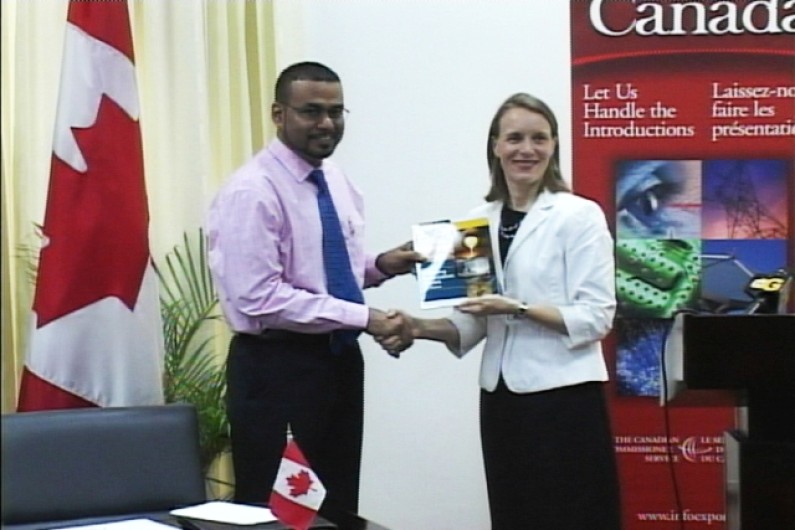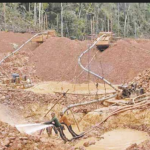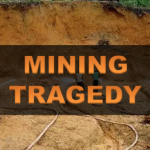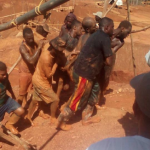
Stakeholders operating in the mining sector are now better equipped to understand the more than a dozen pieces of legislation that directly and indirectly govern the sector, thanks to the latest edition of the Guyana Mining Information Toolkit (GMIT).
The comprehensive mining sector guide was handed over today to Natural Resources and Environment Minister, Robert Persaud by Canadian High Commissioner to Guyana, Dr. Nicole Giles, in the presence of sector stakeholders at the Guyana International Conference Center.
Addressing those gathered for the ceremony, Minister Persaud said the partnership between the Governments of Guyana and Canada provides a methodology for evaluating the positive and negative economic and social effects of mining at the local and regional levels in mining communities. “These methods will be of relevance in particular to the increasing numbers of lower and middle income community economies that have high levels of mineral dependence.”
The GMIT, the minister explained, is designed to be used by mining companies, mine managers organisations and agencies that have an interest in the relationship between mining and economic and social development outcomes. These will also include, he added, host-community local governments, development agencies and development oriented non-governmental organisations (NGOs).
Minister Persaud expressed confidence that once the kit is disseminated and read widely by miners across the country it will engender better compliance and enforcement, consequent to persons understanding their roles. He said too that better management of relationships between miners and local communities will be expected.
It was pointed out that the revised toolkit responds to a clear need in different parts of the country for a more systematic and objective way to quantify and agree ways to enhance, mining’s economic and social contribution. In many communities, the minister said, this is an issue on which there is often much debate, but little clarity, “Whether applied by companies, development agencies or other organisations, the toolkit can help users to: establish the economic and social contribution of mining in a thorough and objective way, apply practical partnership tools, host workshops to constructively shape the debate about mining’s impacts and build consensus for action plans to enhance mining’s contribution through multi-stakeholder partnerships.”
He stressed that in many mining communities, debates about the economic impacts of mining often take place in the absence of information on mining’s economic and social contribution, “There tends to be a focus on particular issues – for example tax revenues or the impact on traditional livelihoods – which do not reflect the full range of impacts and potential contributions from the sector.”
The GMIT will also be beneficial to mining companies, Minister Persaud stated as they have often not been effective in analysing and “articulating the big picture in this way” adding that, there are often misunderstandings and more seriously, “missed opportunities to integrate mining into the broader economy, sub-optimal government policies based on incomplete information which then deters further company investment and a failure to capture the full economic and social benefits from mining for broader society.”
The toolkit can be used to help break this deadlock, he explained, informing the debate, building consensus on the way forward and creating the basis for partnerships that “lead to real, on-the-ground progress.”
The toolkit explores the four broad areas of a mine cycle. These are mineral exploration, mine development, mine cooperation and mine closure. Details of each stage are given by an overview, acts and regulations, environmental and social impacts, community employment and other economic opportunities. The Guyana Mining Information Toolkit promotes the ten (10) principles of sustainable mining development.
These are: implement and maintain ethical business practices and sound systems of corporate governance; integrate sustainable development considerations within the corporate decision-making process; uphold fundamental human rights and respect cultures, customs and values in dealings with employees and others who are affected by mining activities; implement risk management strategies based on valid data and sound science; seek continual improvement of health and safety performance; seek continual improvement of environmental performance; contribute to conservation of biodiversity and integrated approaches to land use planning; facilitate and encourage responsible product design, use, re-use, recycling and disposal of products, contribute to the social, economic and institutional development of the communities in which miners operate, and implement effective and transparent engagement, communication and independently verified reporting arrangements with stakeholders.
The latest “Guyana Mining Information Toolkit” is a revised version of the first which was launched in 2012. (GINA)

















You must be logged in to post a comment Login